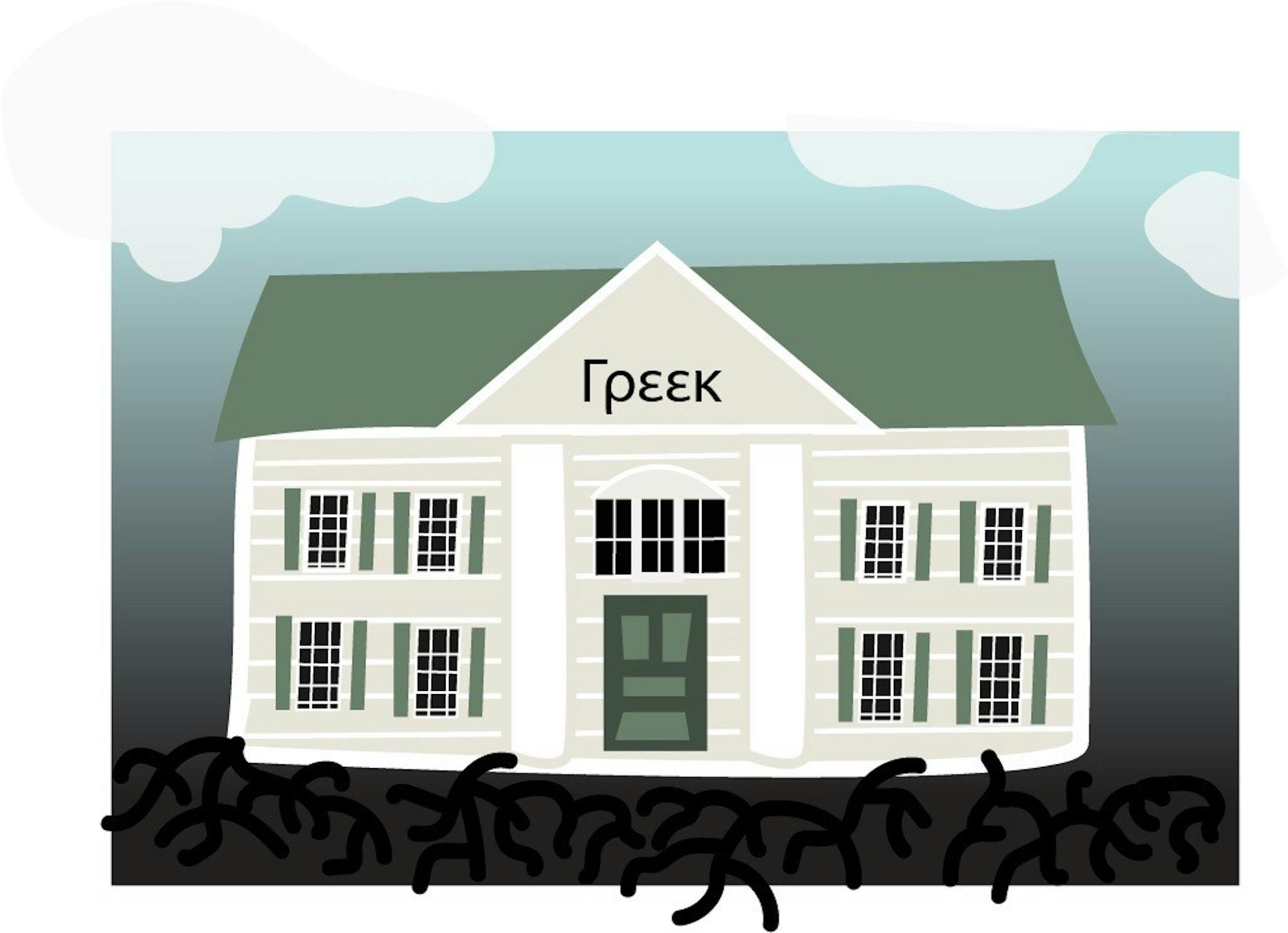The first time I played pong was during my freshman spring in the basement of Chi Gam. My partner was a Dartmouth senior, a Chi Gam member and a would-be Masters finalist. He was also my UGA. Thinking back, there was probably no better introduction to the illustrious game of Dartmouth pong. Unless, of course, I had learned in a sorority. But sororities hadn’t been marketed to me as open spaces, I didn’t know any sorority members and for some reason I was thrilled to be invited into a male space.
When women first matriculated at Dartmouth in 1972, there were no sororities. That changed in 1977, when Leslie Mandel Gordon ’79 and Kate Wiley Laud ’79 invited the national sorority Sigma Kappa to colonize at Dartmouth. Sigma Kappa was the only sorority amidst 26 fraternities, until Kappa Kappa Gamma colonized at Dartmouth in 1978.
For the first five years, Sigma Kappa did not have a physical space on campus. The women met in dormitory lounges, church basements, off-campus houses, classrooms and even fraternities. In 1981, after hunting for off-campus houses and temporarily taking over Foley House, a local fraternity at the time, Sigma Kappa moved into 10 West Wheelock.
Before sororities secured their own spaces, women had to constantly negotiate their presence in male-dominated social spaces. Starting prior to coeducation, with Winter Carnival in the 1910s, women from other colleges would journey to Dartmouth for big party weekends on buses that Dartmouth students called “f— trucks.” After going coed, the College and town provided few social options aside from going to fraternity parties, which Susan Dentzer ’77 described as “walking into a den of cavemen.”
For many students, the sentiment prevails today that fraternities are the only viable social spaces at Dartmouth. Avery Schuldt ’21, treasurer of Kappa Delta Epsilon, recalled thinking as a sophomore, “Doesn’t everyone just go to fraternities? Isn’t that the way it is?”
She feels that not many people want to go to sorority-held parties, and if they do, it’s more like a “pit stop” on their way to spending the rest of their night at fraternities.
This idea — that the only places to let loose are fraternities — can push people into uncomfortable situations. Jada Brown ’21, president of KDE, senses that there exists a double standard.
“When I’m in a fraternity, I feel like I have to put myself on the backburner to make sure I’m not overstepping any boundaries,” Brown said. “But frat bros can walk in and do what they want in most places.”
Maya Khanna ’22, who is researching the history of sororities to uncover history that may have gone unnoticed since coeducation, heard from a “fair amount” of alumnae that the sorority system tends to prop up the fraternity system. She believes that this speaks to a broader power dynamic at Dartmouth where women become commodities for men in power.
“A lot of women said that social interactions are facilitated in a very specific way in very specific spaces, often through alcohol and hooking up,” Khanna explained. “Deviating from that is really difficult, especially for new individuals to Dartmouth who are just trying to dip their feet into the social scene.”
One solution that upends these gender-based power dynamics is popularizing sorority-held parties. According to Brown, KDE frequently has an open basement — “if you knock, someone will let you in and you can get on table” — in addition to events like “Tails” every “on night” and “Super-tails” three or four times a term. KDE is able to host parties because it went local in 1993, becoming unaffiliated with its national organization. In fact, national sororities, which make up half of the sororities at the College, require alcohol-free facilities, according to the standards of the National Panhellenic Conference. Specific chapter rules can be even more restrictive, such as Alpha Xi Delta’s policy that alcoholic beverages must be provided by a third-party vendor or through a “bring your own beverage” system.
Despite facing concerns about the restrictions placed on national sororities at its founding, Sigma Kappa ultimately localized as Sigma Delta in 1988 in order to jettison religion-based rituals and emphasis on men within its organization. Close on its heels was Epsilon Kappa Theta, KDE and, most recently, Chi Delta. However, sorority localization occurred in a more piecemeal fashion than the similar process fraternities went through almost forty years earlier, starting in 1948. Fraternities localized in order to dismantle a discriminatory system. At that time, the College also took concrete measures for fraternities to become more inclusive spaces.
In 1948, former College President John Sloan Dickey announced that the College would no longer “permit certain national fraternities ... to impose prejudice on Dartmouth men.” The following year, the Dartmouth Interfraternity Council recommended to the National Interfraternity Conference that Greek societies repeal constitutional restrictions based on race, religion or nationality, to no avail. Many fraternities went local in order to have more inclusive charters. Ultimately, an administrative system was instituted to hold individual fraternities accountable and eliminate discriminatory clauses.
On the other hand, the road to sorority localization is not as straightforward, as each house has its own views on whether national policies are too restrictive. Mahalia Dalmage ’21, president of the Inter-Sorority Council, thinks joining a national sorority can be worthwhile for those who desire a members-only safe space.
Schuldt remembers a huge debate within KDE her sophomore spring about how open the members wanted the house to be. Although KDE decided to become a more open space, it still holds events that are only for members. The flip side is that it can also invite fraternities over for Tails, open the house to all of campus and show underclassmen what a sorority space looks like.
All of this is not to say that fraternities are incapable of hosting parties where everyone feels comfortable. In fact, the fraternity members I talked to are trying to have more transparent conversations, promote nontoxic house culture and implement implicit bias training. I talked to men who are willing to look critically at the Greek system.
Thomas Clark ’22, the summer philanthropy chair at Sigma Nu, said that during the initiation process, older members insisted on reminding new members to be respectful of people in their house.
I also found out that men want to party in sororities, most are sick of cleaning their basements, and some are maybe just a little too competitive when it comes to pong.
“Instead of the girls going to the fraternity for Tails, we would host Tails,” Schuldt said about her house. “We did this with Psi U and the turnout was crazy. Basically all of Psi U was in KDE’s basement.”
Last winter, as a new member of Epsilon Kappa Theta, I was on door duty for Tails with Gamma Delta Chi, which we hosted at our house on 15 Webster Avenue. For 45 minutes, I sat on the couch in the entryway and stared out the window at the lamplit snow. When the GDX members were leaving, nearly every one of them looked me in the eye, thanked our house for hosting them and wished me a good night. As they thundered out the door, I got the feeling that gender parity is not half as elusive as we think. That idea is pretty intoxicating.



